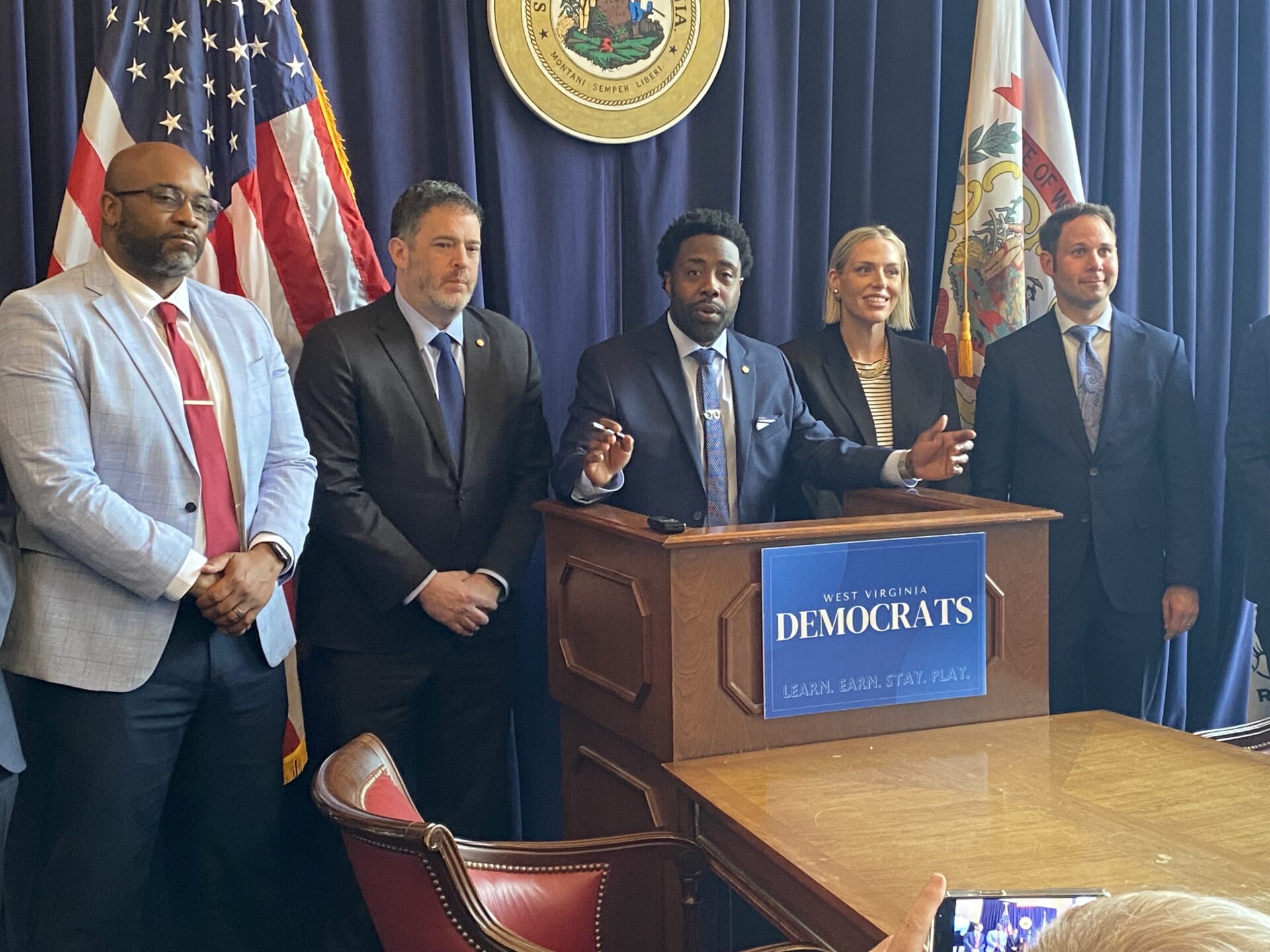House of Delegates Democratic legislators gathered Monday to outline their priorities in the anticipated upcoming special session.
House Minority Leader Sean Hornbuckle, D-Cabell, spoke of bipartisan opposition to a hastily passed budget in the last hours of the regular session. He sees that carrying over to address budget issues that are not election year red meat and culture war proposals.
“We don’t have the final say on the agenda,” Hornbuckle said. “But we are asking Governor Justice and the Republican majority party to truly work with us in a bipartisan manner. We know that we have things that can get across the finish line, to help with actual opportunities that the state has before us, and also to focus on solving real problems.”
One by one, Democratic legislators voiced the problems they plan to help get solved. Del. Kayla Young, D-Kanawha, said over the past 10 years, there’s been a 50 percent cut to child care funding in West Virginia. She said the promises of increased child care access need to be fulfilled.
“We had a set of about seven bills that would help childcare,” Young said. “There’s a federal child care tax credit but not the state one. We’ve heard the governor ask for it, and we’ve stood with him to ask for that child care tax credit in addition to other bills that would have helped our childcare providers, our families and our businesses.”
Del. Mike Pushkin, D-Kanawha, said a special session priority would be to fix the drastic cuts in the Intellectual and Developmental Disabilities Waiver program.
“That’s money from Medicaid,” Pushkin said. “Remember, when you cut that you’re cutting it four times as much because it’s a three to one federal match. And that particular part of the fund is used to help families take care of their loved ones, who are in the most desperate need of help here in West Virginia.”
A major issue for Democrats was reinstating budget cuts of around $150 million in state Medicaid funding. Del. John Williams, D-Monongalia, said the negative effects will be felt by thousands of West Virginians.
“It cuts millions of dollars from CHIP, (the Children’s Health Insurance Program),” Williams said. “Kicking children off their health care insurance, it cuts money going to rural hospitals, it cuts money going to teaching hospitals. Don’t forget the factor that those get federally matched at a four to one rate.”
Del. Joey Garcia, D-Marion, said the looming crisis with Emergency Medical Services can’t wait until 2025.
“Here in 2024, in Mingo and Wayne County, people didn’t need to die,” Garcia said. “Because of some of these areas not having sufficient ambulance services, we had too long of a wait time, and somebody that could have otherwise lived, didn’t make it.”
Two issues needing special session attention were addressed by Del. Evan Hansen, D-Monongalia. The first was returning funding that was vetoed for research at the West Virginia University Rockefeller Neuroscience Institute.
“It’s research into treating Alzheimer’s, research into treating substance use disorder, obesity, things are impacting West Virginians at high rates.” Hansen said. “We have a chance to push that research forward so that medical trials can be done to speed those products into market should they prove to work.”
Hansen said his second issue would be to help approve and fund steps to reduce West Virginia’s electric bills.
“One reason we have such high electric bills, and that they’re rising faster than other states in the country, is due to our reliance on a single source of energy, coal,” Hansen said. “We have opportunities to diversify our energy mix. One bill that was vetoed last session was a small tweak to our utility solar bill that would have allowed our electric utilities to build solar projects cheaper, that would have reduced bills and help attract new manufacturers into the state of West Virginia. Manufacturers that require renewable energy.”
Del. Hollis Lewis, D-Kanawha, said there would be a democratic push to reinstate the $50 million that was supposed to go to develop a West Virginia State University Agricultural Lab.
“This will not only be beneficial to our local area, and West Virginia State University,” Lewis said. “It’s also going to be beneficial to our whole state.”
Hornbuckle said special sessions are like overtime in basketball or extra innings in baseball, except here, the taxpayers pay.
It is yet to be determined when, and even if, a special session will be called.
